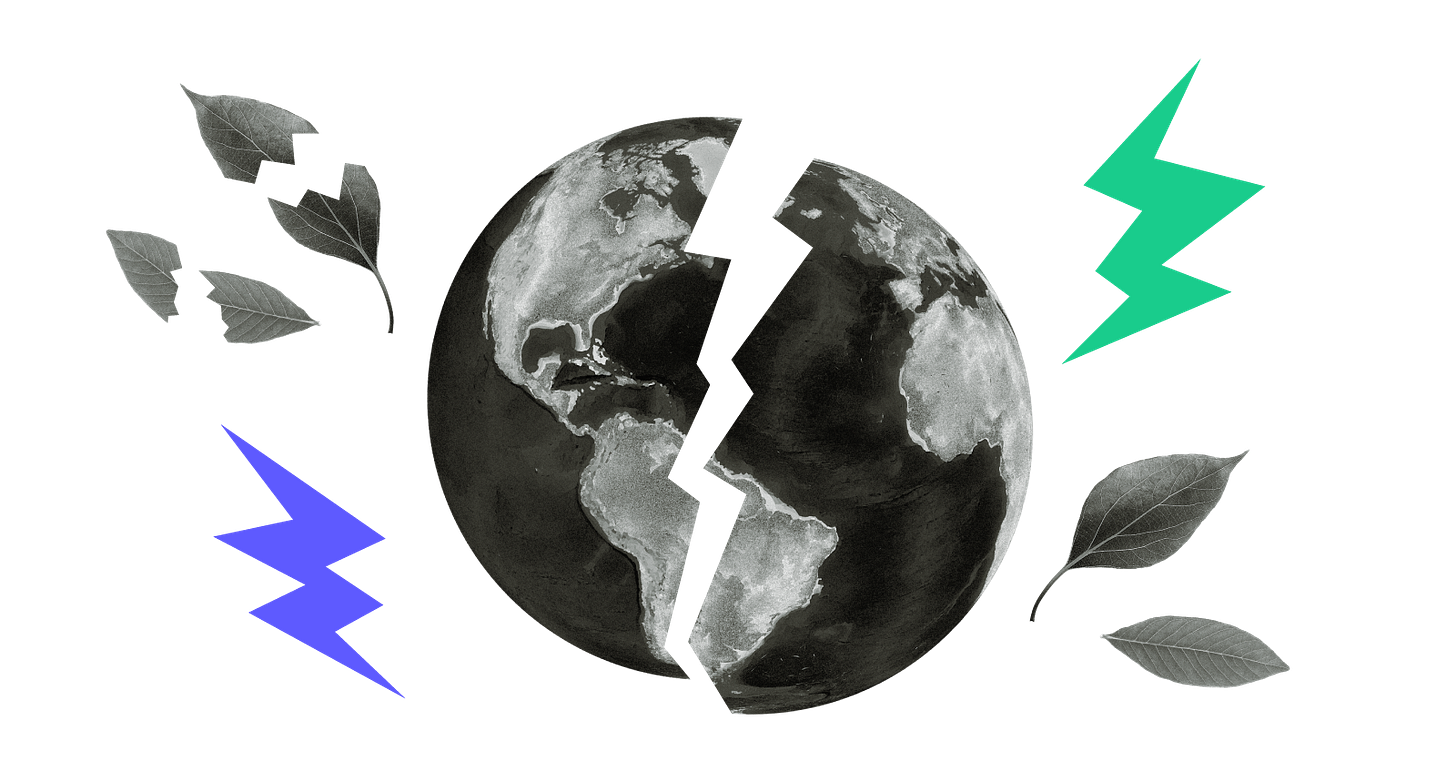New World Same Humans #58
The old world is dead; a new one is being born. There is no alternative.
Welcome to New World Same Humans, a weekly newsletter on trends, technology, and society by David Mattin.
If you’re reading this and you haven’t yet subscribed, then join 16,000+ curious souls on a mission to build a better shared future 🚀🔮
🎧 If you’d prefer to listen to this week’s instalment, go here for the audio version of New World Same Humans #58. 🎧
Here in the UK, this week marks one year since the start of the first coronavirus lockdown.
Time, then, to reflect. A note this week on what we know must change: our relationship with markets, growth, and government. And why it’s time to reclaim an old, politically charged phrase: there is no alternative.
Remember all that talk, during the early days of the pandemic, about a Great Reset? Look back at it now and it seems almost quaint. Twelve months on the evidence is clear: what we got was far more complex than a reset. If anything, the pandemic accelerated some of the deepest and most troubling aspects of the system we inhabit.
Take income and wealth inequality. A new Oxfam report outlines how Covid hit the world’s poorest with disproportionate force. Without government action, say Oxfam, it will take over a decade for the number of people living in poverty worldwide to return to pre-pandemic levels. Meanwhile, Forbes says the world’s 10 richest people increased their wealth by a combined half a trillion US dollars in 2020. Jeff Bezos got $42 billion richer between March and June.
Climate change was at the heart of Great Reset thinking. Carbon emissions were 17% lower in April 2020 than they were 12 months before. But by June they were rising again, and according to the International Energy Agency they’ve now rebounded to pre-pandemic levels. In any case, atmospheric carbon continued to climb throughout the crisis.
Finally, lockdowns were supposed to allow us space to reset our relationship with 21st-century consumerism. Instead we’ve found ourselves dragged deeper into a recursive, dependent relationship with a few big technology platforms: Google, Facebook, Amazon.
What does all this mean?
The idea that we’ve been sold for so long, that individual behaviour change is the answer to our greatest shared challenges – climate change first among them – is dead.
Lockdowns were, among other things, a mass experiment on the impact of individual behaviour change on the climate crisis. We came as close as we’ll ever get to halting all but non-essential economic activity. The result? It wasn’t enough to put a dent in the problem.
Meanwhile, and relatedly, we felt with a new potency the way the big technology platforms, and the version of consumerism they serve us, have insinuated themselves into the fabric of our lives. The idea that we can simply choose to opt out of that system, and so halt the damage we’re doing to the planet, is hollow.
The truth is now undeniable: when it comes to our greatest shared challenges, no amount of behaviour change will ever be enough. We need deep-running structural reform.
What is it, then, that needs to change? The answers are complex, but they point in a single direction: towards the socio-economic system we know as neoliberalism.
Since Thatcher and Reagan enacted the neoliberal revolution in the early 1980s, we’ve prioritised individual choice and free markets over any understanding of the common good. Neoliberalism sold us on its vision of a society peopled by rational and empowered individuals free to pursue their own self-interests. In so doing, it was said, they’d create a whole that was harmonious and just. Free markets and business were the ultimate expression of humankind’s creative genius. Government was slow, bureaucratic, and unimaginative.
In 2021, that philosophy lies in ruins. The pandemic and associated lockdowns were a decisive reminder of the unique and necessary power of the collective. What future can there be for neoliberal market fundamentalism when across the industrialised world only government support – to the tune of trillions of dollars – prevented catastrophic economic collapse? It turns out that markets are not, after all, gods that must rule our destiny. They’re only tools that we make: useful, but fragile and contingent. When they fail, the collective – that means government – is the guarantor of our way of life.
Historians love to delineate historical eras. Neoliberalism 1979 to 2020 will soon be the era that launched a thousand PhD theses.
So what next?
When UK prime minister Margaret Thatcher began her programme of deregulation in the early 1980s, she emblazoned it with a slogan that will be forever associated with the neoliberal project: there is no alternative. By which was meant: there is no alternative to free markets. There is no alternative to this unrestrained variant of global capitalism.
I can’t hear all that now without being struck by an idea. The slogan is ripe to be seized by those who argue for structural transformation.
Because in 2021, there is alternative but to build a new relationship with markets: one that prioritises human wellbeing. There is no alternative but to wake from our dream of infinite growth. There is no alternative but to acknowledge that we are bound to one another, and to all of nature, via bonds that cannot be undone. We are not only a collection of atomised individuals; we are a whole.
What does the transformation we need look like in practice? We’ll spend the next ten years, or longer, figuring that out. But a new wave of ideas is taking shape. Here in the UK the rising political theorist Will Davies has called for a generation of ‘legal and economic rebuilders’ to create new structures for the decades ahead.
First among those would be new structures of enterprise and ownership. Structures, for example, that allow workers to own a stake in the businesses they work for, and to share in the profits they generate.
One model? This recent paper, The Mutualist Economy: A New Deal for Ownership, by Nils Gilman and Yakov Feygin from think tank the Berggruen Institute proposes a new social contact for a world of automation, in which each citizen is given an ‘individual capital endowment’. In other words, everyone gets a stake in the machines that generate wealth, and everyone gets to share in the spoils. I can’t help feeling I’ve heard that idea somewhere before.
Meanwhile, economist Mariana Mazzucato is drawing the outlines of a new relationship between government, enterprise, and innovation. Mazzucato imagines a world in which EU support for clean energy, sustainable transport, and efficient buildings creates 100 carbon-neutral cities across Europe by 2023. It was governments, she reminds us, that created the internet, and put humans on the moon. Only government acting in partnership with a thousand enterprises can forge the clean energy revolution that we need now.
The new world we need to build is still, in 2021, just a vision. But the plans are being drawn. We need to get to work.
As we enact a transformation for the 2020s, let’s reclaim the slogan there is no alternative. This time around, it’s true.
Make It New
Thanks for reading this week.
New World Same Humans is a community founded on one principle: that we shouldn’t leave our shared future to the powers that be. Instead, we should help to build it.
Our amazing community of founders, designers, marketers, technologists, researchers, and policy makers continues to grow. Let’s keep that going!
If this week’s instalment struck a chord, please consider forwarding the email to someone who’d also enjoy it. Or share this across one of your social networks, with a note on why you found it valuable.
I’ll be back on Wednesday with New Week Same Humans. See you then,
David.



